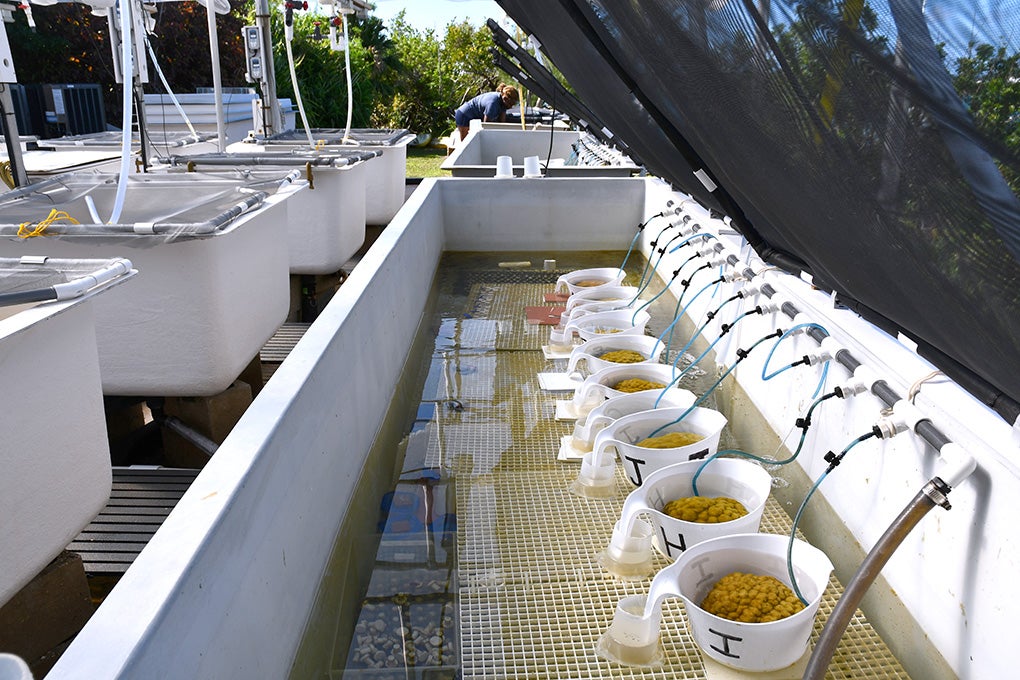
Coral Thermal Tolerance and Heat Stress Mitigation Strategies
Global warming is considered to be the most severe threat to coral reefs. This is evident in an increase of frequency and severity of global coral bleaching events (loss of coral symbionts due to heat stress) leading to coral death and reef degradation. The current focus of the MABEE lab is to find ways to mitigate the impact of global warming on corals by either strengthening corals to resist marine heat waves (ENCORE project) or by altering the environment to reduce thermal stress (AU Coral project).
Current Projects
AU Coral (NSF-funded #2320629, since 2023, lead-PI: Sawall): The MABEE lab is one of very few labs that explores the potential utility of artificial upwelling (AU), a geoengineering technology that uplifts cooler deep water to the warm surface waters during heat stress events. This reef management tool could offer a localized mid-term solution to allow corals a more gradual adjustment to global warming. The overarching goal of the AU Coral project is to provide an understanding about how AU could be used for surface water cooling by identifying AU scenarios (depth, duration) that mitigate coral bleaching effectively, while imposing minimal risk of unwanted side effects. Here we focus on creating daily short-term thermal refugia (pulsed AU for a few hours a day) with waters from the intermediate and lower euphotic zone (30-100 m). Using the BMMF facility, we investigate immediate and lasting effects (legacy) of AU on coral physiology during heat stress. Furthermore, we assess reef community responses to heat stress and to heat stress + AU.
Lab participants: Chloe Carbonne, Janna Hynds, Jacob Welter, Teagan Roome, Elli Dunleavy, and various undergraduate students in Bermuda and Tempe.
Collaborators: Liza Roger (ASU), Maysa Ito (GEOMAR, GER), ASU proteomics core facility and team
ENCORE (funded by Heising-Simons Foundation International, since 2022): The overall goal of this collaborative project is to address coral resilience, acclimatization, and adaptation to a warming ocean. We use Bermuda as a high-resolution test bed with a broad comparison of our Atlantic (Bermuda) site with one Pacific (Hawaiʻi USA) and one Caribbean (Cayman Islands) reef site, enabling broader geographic applicability of our results. The questions addressed include: A) How do differences in environmental conditions experienced across a range of geographic locations impact the resistance and resilience of corals to thermal stress? What are the molecular and cellular mechanisms that enable coral resilience? B) Do different life stages of corals express differences in thermal resistance (adults, larve, spat)? What is the legacy of thermal stress - long-term weakening or stress hardening?
To address these questions, a combination of in-situ and experimental manipulation studies using mesocosms (e.g., BMMF) and / or aquaria is used, in conjunction with physiological measurements and molecular analyses. The study is conducted in collaboration with Samantha de Putron (BIOS), Gretchen Goodbody-Gringley (CCMI) and Hollie Putnam (URI). Post-doc of the project is Brett Jameson and participating PhD students are from the Putnam Lab.
PIs: Yvonne Sawall, Samantha de Putron (BIOS until 2024), Gretchen Goodbody-Gringley (CCMI), Hollie Putnam (URI)
Lab participants and others: Brett Jameson, Florence Fields (PhD student URI), undergraduate students and short-term visiting graduate students.
Past Projects
AU Reef (DFG-funded, 2017-2019). This award allowed to conduct some preliminary studies on the potential use of artificial upwelling (AU) during heat stress on coral physiology (manipulation experiment, Sawall et al. 2020, see also ) and on surface waters biogeochemistry (modelling approach, Feng et al. 2020).
Lead-PI: Yuming Feng (GEOMAR, GER)
Collaborators: Yvonne Sawall, Marlene Wall (GEOMAR, GER), Mario Lebrato (BCSS, Mozambique)